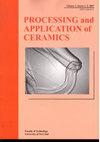8Y2O3-ZrO2、La2Zr2O7、La2(Zr0.7Ce0.3)2O7和La2Ce2O7热障涂层双相、多层功能梯度和多层结构的热疲劳特性
IF 0.8
4区 材料科学
Q3 MATERIALS SCIENCE, CERAMICS
引用次数: 0
摘要
制备了La2Zr2O7、La2(Zr0.7Ce0.3)2O7和La2Ce2O7焦绿盐等离子喷涂粉末,并用NiCrAlY键合层对钢板进行等离子喷涂。使用了三种不同的结构:双相、多层功能梯度和多层,并使用了8%氧化钇稳定氧化锆(8YSZ)和NiCrAlY(结合涂层)层的不同组合。将制备的涂层与标准双相8YSZ热障涂层(tbc)进行了比较,以研究其作为tbc的适用性。涂层吗?通过扫描电镜研究了喷镀TBCs的抛光截面金相样品的层厚和界面。通过在1200℃和1400℃的温度下将气体火焰对准陶瓷表面,然后迅速撤出并通过基座风扇强制冷却,来评估热疲劳抗力。确定了涂层在失效前所能承受的最大热冲击循环次数。与其他复合材料相比,复合材料的抗热疲劳性能更好。这些发现与通过XRD得到的陶瓷涂层的晶相相相关,并结合已有文献进行了讨论。本文章由计算机程序翻译,如有差异,请以英文原文为准。
Thermal fatigue characteristics of 8Y2O3-ZrO2, La2Zr2O7, La2(Zr0.7Ce0.3)2O7 and La2Ce2O7 thermal barrier coatings in duplex, multilayer functionally graded and multilayer configurations
La2Zr2O7, La2(Zr0.7Ce0.3)2O7 and La2Ce2O7 pyrochlore plasma sprayable powders were synthesized and plasma spray coated on steel plates with NiCrAlY bond coat. Three different configurations were used: duplex, multilayer functionally graded and multilayer, with different combinations of commercial 8% yttria stabilized zirconia (8YSZ) and NiCrAlY (bond coat) layers. The prepared coatings were compared with the standard duplex 8YSZ thermal barrier coatings (TBCs) with a goal to study their suitability to serve as TBCs. TBCs? layer thicknesses and interfaces were studied via SEM on polished cross section metallographic samples removed from the spray coated TBCs. Thermal fatigue resistance was evaluated by directing a gas flame on the ceramic surface at 1200 and 1400 ?C, followed by its rapid withdrawal and forced cooling by pedestal fan. The maximum number of thermal shock cycles the coatings could withstand before failure was determined. The multilayered TBCs with lanthanum cerate composition stacked with 8YSZ exhibited the superior thermal fatigue resistance characteristics compared to all other studied TBCs. The findings were correlated with the crystalline phases of the ceramic coatings, obtained via XRD, and discussed in the light of existing literature.
求助全文
通过发布文献求助,成功后即可免费获取论文全文。
去求助
来源期刊

Processing and Application of Ceramics
MATERIALS SCIENCE, CERAMICS-
CiteScore
1.90
自引率
9.10%
发文量
14
审稿时长
10 weeks
期刊介绍:
Information not localized
 求助内容:
求助内容: 应助结果提醒方式:
应助结果提醒方式:


